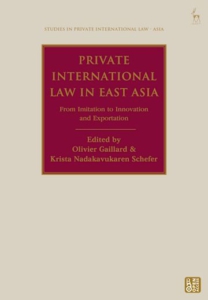Out Now: Private International Law in East Asia: From Imitation to Innovation and Exportation (Gaillard/Nadakavukaren Schefer)
Hart Studies in Private International Law – Asia has officially released its 9th Volume in the Series as an open-access book. This edition, edited by Olivier Gaillard and Krista Nadakavukaren Schefer, is titled Private International Law in East Asia: From Imitation to Innovation and Exportation (Hart Publishing, 2024).

The description of the book reads as follows:
This open access book examines the conflict of law rules in East Asian states. With a focus on the laws in Mainland China, Japan and South Korea, the book also looks at the rules of Hong Kong and Taiwan.
Beyond a description of the substance of the current law, the book highlights the evolution these jurisdictions have undergone since being adopters of rules developed in European and North American legal systems. As evidenced by recent modernisations in their private law regimes, these East Asian states are now innovators, creating rules that are more suited to the local concerns. Significantly, the new approaches to private international law taken by China and Japan are themselves being adopted by other jurisdictions, shifting the locus of influence in this important area of law.
The chapters in Part 1 give a contextual overview of the legal regimes of Mainland China, Japan, and South Korea. This part is intended to foster a deeper understanding of how the systems are changing to better fit the particular national approaches to law. A more in-depth view of the rules on private international law follows in Part 2, where the rules of Hong Kong and Taiwan are set forth in addition to those of the rest of China, Japan and South Korea. Part 3 provides a detailed look at the conflict rules relevant to commercial law, specifically as regards international jurisdiction of courts, while Part 4 examines the rules applying to family and succession law.
Written in an easily accessible style, the book is a valuable resource for scholars as well as practitioners of East Asian law, private international law, and comparative law.
The table of Contents features the following papers:
- Introduction, Krista Nadakavukaren Schefer (Swiss Institute of Comparative Law, Switzerland) and Jun Zheng (University of Fribourg, Switzerland)Part 1: General Overview of Legal Regimes
- Introduction to the Law of the People’s Republic of China, Harro von Senger (Swiss Institute of Comparative Law, Switzerland)
- The Structure and General Principles of Japanese Law, Béatrice Jaluzot (Institut d’Asie Orientale, France)
- Legal Transfer and Law in Transition: Compulsory Share in Korean and Japanese Law, Marie Seong-Hak Kim (Minneapolis, USA)
- Influence of Japanese Law on Taiwanese Law, Ying-Hsin Tsai (National Taiwan University)
Part 2: Rules on Private International Law
- On the Process of China’s Private International Law in the Past Decade, Jin Huang (China University of Political Science and Law)
- New Developments of Private International Law in Japan and East Asia, Yuko Nishitani (Kyoto University, Japan)
- Private International Law Developments in Hong Kong, Wilson Lui (University of Hong Kong)
- New Developments in Korean Private International Law, Jong Hyeok Lee (Seoul National University, South Korea)Part 3: Relations of Courts
- Choice-of-Court Agreements in Japanese Conflict of Laws, Dai Yokomizo (Nagoya University, Japan)
- The 1965 Basic Treaty: An Obstacle to ‘Normal’ Relations between South Korea and Japan? Samuel Guex (University of Geneva, Switzerland)Part 4: Family and Succession Law
- New Developments in Chinese Private International Law in the Area of International Family Law: 12 Years after the Entry into Force of the Chinese PIL Act, Weizuo Chen (Tsinghua University, China)
- Some Recent Issues in Family Law and International Family Law in Japan, Mari Nagata (Osaka University, Japan)
- The Applicable Law in Succession Matters in China, Japan and South Korea: The Professio Iuris as a Bridge? Olivier Gaillard (Swiss Institute of Comparative Law, Switzerland)
- Conclusions, Olivier Gaillard (Swiss Institute of Comparative Law, Switzerland)


